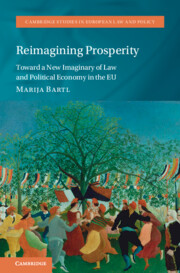Book contents
- Reimagining Prosperity
- Cambridge Studies in European Law and Policy
- Reimagining Prosperity
- Copyright page
- Contents
- Series Editors’ Preface
- Acknowledgements
- 1 Introduction
- 2 Imaginaries of Prosperity
- 3 Reimagining Consumption
- 4 Designing Technology
- 5 Reinventing Industrial Policy
- 6 Transforming the Corporation
- 7 Conclusion
- Select Bibliography
- Index
- References
Select Bibliography
Published online by Cambridge University Press: 18 October 2024
- Reimagining Prosperity
- Cambridge Studies in European Law and Policy
- Reimagining Prosperity
- Copyright page
- Contents
- Series Editors’ Preface
- Acknowledgements
- 1 Introduction
- 2 Imaginaries of Prosperity
- 3 Reimagining Consumption
- 4 Designing Technology
- 5 Reinventing Industrial Policy
- 6 Transforming the Corporation
- 7 Conclusion
- Select Bibliography
- Index
- References
- Type
- Chapter
- Information
- Reimagining ProsperityToward a New Imaginary of Law and Political Economy in the EU, pp. 215 - 228Publisher: Cambridge University PressPrint publication year: 2024
- Creative Commons
- This content is Open Access and distributed under the terms of the Creative Commons Attribution licence CC-BY-NC 4.0 https://creativecommons.org/cclicenses/

